Does your child wash his hands as often as he or she should? Prevention is better than cure, and if the precaution is so basic, you should make sure its well ingrained in your kids, so frequent hand washing becomes a habit that lasts a lifetime.Five-year-old Aryaman was perpetually down with a cold. His mother, Gita, blamed it on the pollution, the school children and his preference for ice creams, until one day it struck her that Aryaman constantly needed reminding before he washed his hands. So, what did he do at school? Did he ever wash his hands before eating, or after playing cricket or basketball in the sun? When his hands were laden with dirt and filth, did he think twice before grabbing a sandwich? The answer to all these questions was a resounding NO. So, she decided to concentrate on getting Aryaman to wash his hands more regularly. Aryaman and Gita - both slowly started getting more hygiene conscious - and consequently his colds reduced drastically. And Gita? She too started keeping healthier. While earlier she used to get sick about twice a year, it has now been two years since she has placed a thermometer in her mouth! In this articleWhy is it important to wash hands?Will you fall sick if you dont wash your hands often?When should you wash your hands?How often should you wash your hands?For how long should one wash his or her hands to kill the germs?How should you wash your hands?What are the risks of washing hands too frequently?Is using a hand sanitizer a good alternative for cleaning hands?How to clean hands using an alcohol-based hand sanitizer?What are the risks of using hand sanitizer too frequently?Does regular hand washing kill viruses?What is the role of a soap?What are the different types of products used for hand washing?What is the best way to wash hands?Can washing hands with warm water make any difference?What are the ways to dry hands after washing?How many germs are found on hands?Which are the different types of hand cleansing agents?How many germs can be killed through hand washing?For how long do hands remain germ free after washing them?What are the 7 steps of hand washing recommended by WHO?Why is it important to wash hands?It is important to wash hands with clean water and soap as it helps to wash away all the disease causing germs. If hands are not washed properly, these disease-causing germs can enter the body when individuals unconsciously touch their eyes, mouth and nose. Hand washing with good soap and water is a must to remove all the germs.Will you fall sick if you dont wash your hands often?Of course, all this has a lot to do with the strength of your immunity system. If your immune system is all powerful, you can probably get away with washing your hands just 3-4 times a day. But in any case, frequent hand washing is a good habit, which is not time consuming, and is a small price to pay for a lifetime of good health and hygiene.One of the most common causes of the common cold is that people come into contact with others who have the flu, and then they rub their nose or eyes without washing their hands.However, while the common cold is a mild ailment, other serious diseases like jaundice, meningitis and infectious diarrhoea also spread in this manner. You can prevent these fatal diseases by simply washing your hands frequently.When should you wash your hands?Every time your hands come into contact withA contaminated surfaceAn unwell personAn unclean animalThey pick up germs. These germs breed and multiply on your hands and under your nails, and the minute you touch your eyes, nose or mouth, these germs find their way into your body and start the process of infection.How often should you wash your hands?You should wash your hands as often as possible, especially:Before mealsAfter mealsBefore cookingAfter cookingAfter returning home from an outingAfter touching your petAfter using a toiletAfter touching dirt or garbageAfter touching an object or a surface which is frequently touched by others (handles, doorknobs, tables etc.)After coughingAfter sneezingAfter blowing your noseAfter you shake handsBefore touching your face, eyes, nose or lipsAfter changing a baby’s diaperAfter you are done helping a child with potty trainingBefore and after giving first aid to someone or to yourselfIf someone in your home is unwell, you should wash your hands more frequently. You should also make it a point to regularly disinfect surfaces when cleaning them.For how long should one wash his or her hands to kill the germs?It is important to wash hands thoroughly for 20 to 30 seconds to kill all the germs. It is important to be mindful about the time that you take to wash your hands during the epidemics or if you are helping sick people. Washing hands for 20 to 30 seconds with soap is important for making the soap act on germs to kill them.How should you wash your hands?First, wet your hands and then apply soap. It is best to use a liquid soap like Dettol. Dettol has the advantage of being an antiseptic soap.Make sure you apply soap all over your hands, up to your wrists. We tend to neglect the nails when we are washing our hands. Dont! Apply the soap under your nails as well.Rub your hands together for at least 20 to 30 seconds. Lather well. Theres no point in washing your hands in a haphazard manner, for if some germs remain, they will multiply in no time and you would have defeated the purpose.Rinse your hands thoroughly and dry them well. While its okay if you use a regular hand towel, if you want to be more hygienic, keep a box of thick paper tissues in your bathroom, which you can discard after one wash. Alternatively, hang out fresh hand towels often.What are the risks of washing hands too frequently?It is good to wash hands frequently but washing hands too often can cause them to dry out, crack and start bleeding. In this way, it becomes easier for germs to enter the body. To prevent this condition, one can use moisturizing lotion or cream that can be applied to hands. The best way to moisturize hands is to massage them with coconut oil before going to bed. Coconut oil also has antibacterial properties which can help to keep germs at bay.Is using a hand sanitizer a good alternative for cleaning hands?Using a hand sanitizer can be a good alternative for cleaning hands as it takes less time as compared to washing hands with soap and water in the sink. However, using hand sanitizer may not work if dirt, food or any other matter is stuck on hands. Hand sanitizers work well with killing all the microorganisms on hands (According to some research, it can kill COVID-19 but it is not effective on killing all kinds of germs and microorganisms). They can come handy while travelling and are easily accessible.How to clean hands using an alcohol-based hand sanitizer?Using an alcohol-based hand sanitizer is quite easy. When you buy an alcohol-based hand sanitizer, make sure to check whether it contains 60% alcohol. To clean your hands with hand sanitizer, you can take a pea-sized hand sanitizing gel on your palm. Rub the gel on both of your palms, fingers, in between fingers and on the outer sides of your palms until the hands become dry.What are the risks of using hand sanitizer too frequently?Just like washing hands too frequently, frequent use of sanitizers can cause skin disorder. It can cause abrasion of skin and make it easier for germs to find a way to enter the body easily. It can kill the healthy bacteria that usually helps to keep the pathogens at bay.Does regular hand washing kill viruses?Regular hand washing may not be able to kill viruses but can destroy the bacteria and render the viruses useless.What is the role of a soap?Washing hands with soap can provide benefits that washing hands only with water cannot. Soap helps in destroying and knocking-off different microorganisms and microbes like coronavirus.What are the different types of products used for hand washing?If regular soap is not available, products like detergent powder, liquid hand wash, dishwash bar or detergent soaps can be used for washing hands. However, products like detergent, dishwash bar or detergent soaps should not be used frequently as they can cause hands to become dry. These kinds of products should only be used in case of emergency. In case if an individual is allergic to detergent powder, detergent soaps, dishwash bars etc; he or she should avoid using it.What is the best way to wash hands?To wash your hands in the best possible way you must rub them under clean running water in the sink. Once the hands become wet, take soap and thoroughly rub your hands and fingers with it. After you finish cleaning your hands with soap, wash them under running water to clean-off all the soap for 20 seconds. Use a clean towel to dry your hands.Can washing hands with warm water make any difference?There is no need to wash hands with warm water. Temperature of water does not matter. Both warm and cold water can kill germs provided that soap is used.What are the ways to dry hands after washing?As germs can spread faster through wet hands, it is necessary to dry hands immediately after washing them. To dry hands one can use a clean towel or a clean paper. One can also dry his or her hands under an air dryer.How many germs are found on hands?According to some studies 1500 germs can be traced on each square centimetre of skin on our hands. They thrive even in more numbers in the areas between the fingers and underneath the nails.Which are the different types of hand cleansing agents?The hand cleansing agents can be divided in three different types. They are as follows:1) Detergents – These are plain soaps used with water to remove dirt and germs.2) Antiseptic surgical scrubs – These surgical scrubs include scrubs like betadine.3) Antimicrobial agents – These antimicrobial agents include agents like chlorhexidine.How many germs can be killed through hand washing?According to research, when hands are washed for at least 15 seconds with soap and water hands become 90% germ free. To get 99.9% germ free hands another round of 15 seconds should be added to the hand washing regimen. So, to get germ free hands it is necessary to wash hands with soap and water for at least 20 to 30 seconds on an average.For how long do hands remain germ free after washing them?Hands can carry germs again if a person touches contaminated substances or surfaces immediately after washing hands. Therefore, it is always advisable to wash hands before and after eating or before touching face, eyes, nose or lips. At the same time to keep the hands clean after washing it is mandatory to stay away from the substances and surfaces that may carry germs.What are the 7 steps of hand washing recommended by WHO?The ideal time that is recommended by WHO to wash hands thoroughly is at least 20 seconds. Take a quick look at these steps.Step 1: Wet Your HandsWet your hands and apply an adequate amount of soap that can help you to create a good amount of lather.Step 2: Rub Your PalmsRub your palms together in clockwise and anticlockwise direction.Step 3: Rub Back Side of Your HandsRub the back side of your hands with the help of your fingers.Step 4: Rub Palms and FingersRub your palms and fingers together by interlinking and clasping them together.Step 5: Form Cup with FingersRub both of your hands by forming a cup with fingers. By interlocking your fingers, rub the back side as well.Step 6: Clean Your ThumbsClean your thumbs by rubbing them with the help of your fingers.Step 7: Rub Your PalmsUse your fingers to rub the palms of both of your hands.After you follow the above-mentioned steps, you must clean your hands thoroughly with clean water and then dry them using a clean towel.Remember, germs are everywhere, and the more surfaces your hands come into contact with, the more germs you pick up. The importance of washing your hands often to disinfect them and to get rid of the buggers cannot be stressed enough.How to wash hands the right way? Why is it necessary to wash hands for 20 seconds? What is the importance of using soap while washing hands? Discuss here.
Does your child wash his hands as often as he or she should? Prevention is better than cure, and if the precaution is so basic, you should make sure it's well ingrained in your kids, so frequent hand washing becomes a habit that lasts a lifetime.Five-year-old Aryaman was perpetually down with a cold. His mother, Gita, blamed it on the pollution, the school children and his preference for ice creams, until one day it struck her that Aryaman constantly needed reminding before he washed his hands. So, what did he do at school? Did he ever wash his hands before eating, or after playing cricket or basketball in the sun? When his hands were laden with dirt and filth, did he think twice before grabbing a sandwich? The answer to all these questions was a resounding NO. So, she decided to concentrate on getting Aryaman to wash his hands more regularly. Aryaman and Gita - both slowly started getting more
hygiene conscious - and consequently his colds reduced drastically. And Gita? She too started keeping healthier. While earlier she used to get sick about twice a year, it has now been two years since she has placed a thermometer in her mouth!
Why is it important to wash hands?
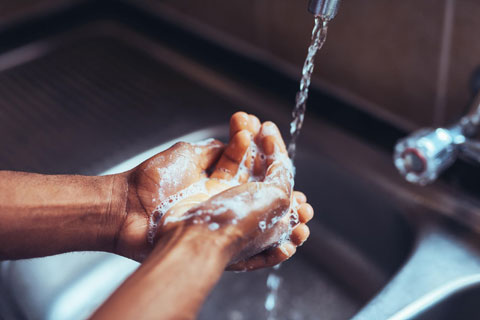
It is important to wash hands with clean water and soap as it helps to wash away all the disease causing
germs. If hands are not washed properly, these disease-causing germs can enter the body when individuals unconsciously touch their eyes, mouth and nose. Hand washing with good soap and water is a must to remove all the germs.
Will you fall sick if you don't wash your hands often?
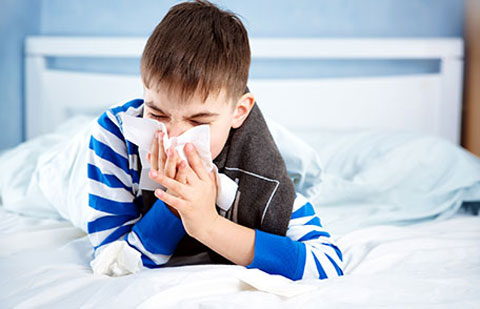
Of course, all this has a lot to do with the strength of your immunity system. If your immune system is all powerful, you can probably get away with washing your hands just 3-4 times a day. But in any case, frequent hand washing is a good habit, which is not time consuming, and is a small price to pay for a lifetime of good health and hygiene.
One of the most common causes of the common cold is that people come into contact with others who have the flu, and then they rub their nose or eyes without washing their hands.
However, while the common cold is a mild ailment, other serious diseases like jaundice, meningitis and infectious diarrhoea also spread in this manner. You can prevent these fatal diseases by simply washing your hands frequently.
When should you wash your hands?
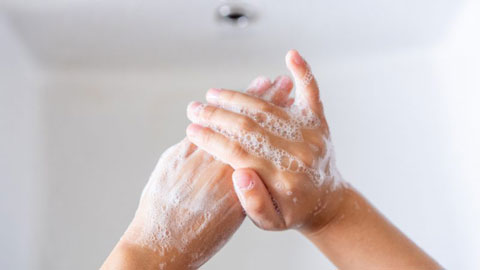
Every time your hands come into contact with
- A contaminated surface
- An unwell person
- An unclean animal
They pick up germs. These germs breed and multiply on your hands and under your nails, and the minute you touch your eyes, nose or mouth, these germs find their way into your body and start the process of infection.
How often should you wash your hands?
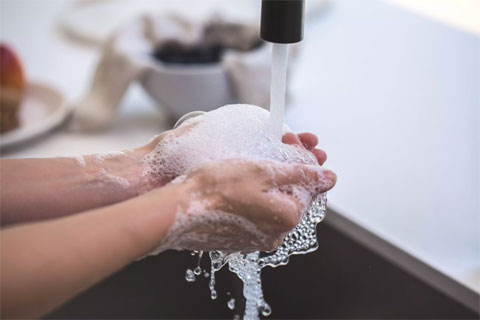
You should wash your hands as often as possible, especially:
- Before meals
- After meals
- Before cooking
- After cooking
- After returning home from an outing
- After touching your pet
- After using a toilet
- After touching dirt or garbage
- After touching an object or a surface which is frequently touched by others (handles, doorknobs, tables etc.)
- After coughing
- After sneezing
- After blowing your nose
- After you shake hands
- Before touching your face, eyes, nose or lips
- After changing a baby’s diaper
- After you are done helping a child with potty training
- Before and after giving first aid to someone or to yourself
If someone in your home is unwell, you should wash your hands more frequently. You should also make it a point to regularly disinfect surfaces when cleaning them.
For how long should one wash his or her hands to kill the germs?

It is important to wash hands thoroughly for 20 to 30 seconds to kill all the germs. It is important to be mindful about the time that you take to wash your hands during the epidemics or if you are helping sick people. Washing hands for 20 to 30 seconds with soap is important for making the soap act on germs to kill them.
How should you wash your hands?
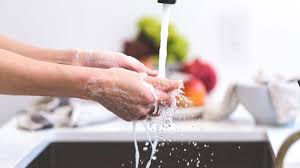
- First, wet your hands and then apply soap. It is best to use a liquid soap like Dettol. Dettol has the advantage of being an antiseptic soap.
- Make sure you apply soap all over your hands, up to your wrists. We tend to neglect the nails when we are washing our hands. Don't! Apply the soap under your nails as well.
- Rub your hands together for at least 20 to 30 seconds. Lather well. There's no point in washing your hands in a haphazard manner, for if some germs remain, they will multiply in no time and you would have defeated the purpose.
- Rinse your hands thoroughly and dry them well. While it's okay if you use a regular hand towel, if you want to be more hygienic, keep a box of thick paper tissues in your bathroom, which you can discard after one wash. Alternatively, hang out fresh hand towels often.
What are the risks of washing hands too frequently?
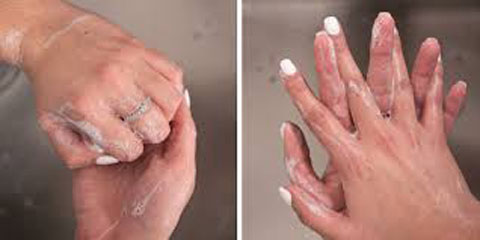
It is good to wash hands frequently but washing hands too often can cause them to dry out, crack and start bleeding. In this way, it becomes easier for germs to enter the body. To prevent this condition, one can use moisturizing lotion or cream that can be applied to hands. The best way to moisturize hands is to massage them with coconut oil before going to bed. Coconut oil also has antibacterial properties which can help to keep germs at bay.
Is using a hand sanitizer a good alternative for cleaning hands?

Using a hand sanitizer can be a good alternative for cleaning hands as it takes less time as compared to washing hands with soap and water in the sink. However, using hand sanitizer may not work if dirt, food or any other matter is stuck on hands. Hand sanitizers work well with killing all the microorganisms on hands (According to some research, it can kill COVID-19 but it is not effective on killing all kinds of germs and microorganisms). They can come handy while travelling and are easily accessible.
How to clean hands using an alcohol-based hand sanitizer?
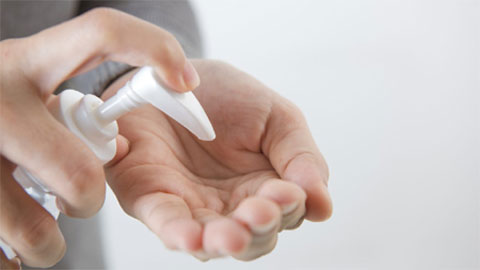
Using an alcohol-based hand sanitizer is quite easy. When you buy an alcohol-based hand sanitizer, make sure to check whether it contains 60% alcohol. To clean your hands with hand sanitizer, you can take a pea-sized hand sanitizing gel on your palm. Rub the gel on both of your palms, fingers, in between fingers and on the outer sides of your palms until the hands become dry.
What are the risks of using hand sanitizer too frequently?
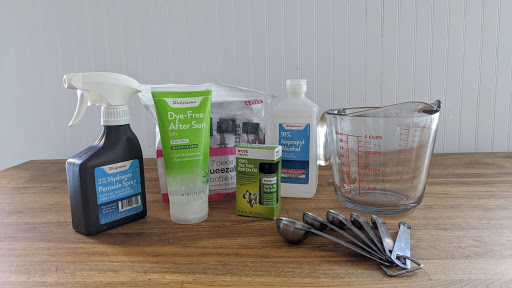
Just like washing hands too frequently, frequent use of sanitizers can cause skin disorder. It can cause abrasion of skin and make it easier for germs to find a way to enter the body easily. It can kill the healthy bacteria that usually helps to keep the pathogens at bay.
Does regular hand washing kill viruses?
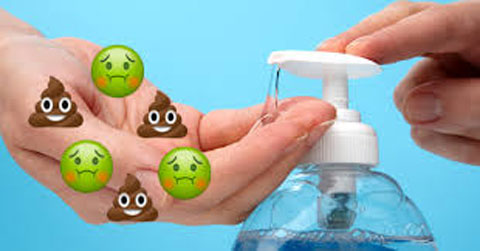
Regular hand washing may not be able to kill viruses but can destroy the bacteria and render the viruses useless.
What is the role of a soap?
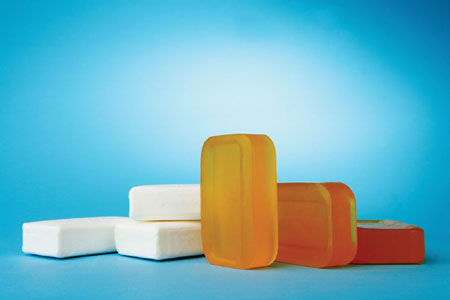
Washing hands with soap can provide benefits that washing hands only with water cannot. Soap helps in destroying and knocking-off different microorganisms and microbes like coronavirus.
What are the different types of products used for hand washing?

If regular soap is not available, products like detergent powder, liquid hand wash, dishwash bar or detergent soaps can be used for washing hands. However, products like detergent, dishwash bar or detergent soaps should not be used frequently as they can cause hands to become dry. These kinds of products should only be used in case of emergency. In case if an individual is allergic to detergent powder, detergent soaps, dishwash bars etc; he or she should avoid using it.
What is the best way to wash hands?
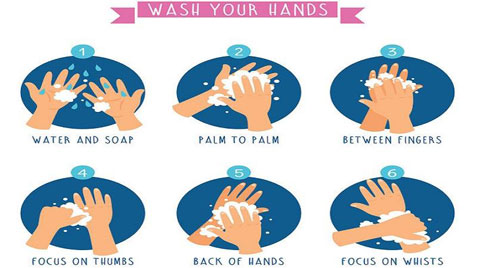
To wash your hands in the best possible way you must rub them under clean running water in the sink. Once the hands become wet, take soap and thoroughly rub your hands and fingers with it. After you finish cleaning your hands with soap, wash them under running water to clean-off all the soap for 20 seconds. Use a clean towel to dry your hands.
Can washing hands with warm water make any difference?
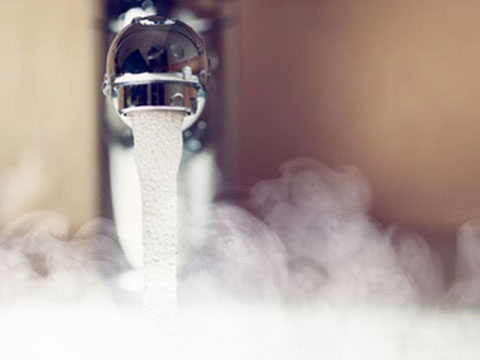
There is no need to wash hands with warm water. Temperature of water does not matter. Both warm and cold water can kill germs provided that soap is used.
What are the ways to dry hands after washing?
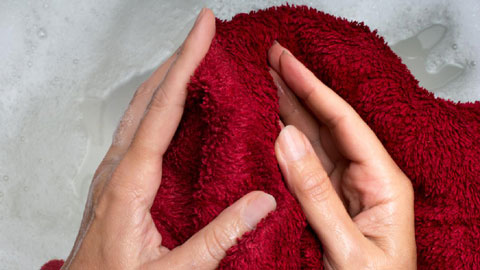
As germs can spread faster through wet hands, it is necessary to dry hands immediately after washing them. To dry hands one can use a clean towel or a clean paper. One can also dry his or her hands under an air dryer.
How many germs are found on hands?
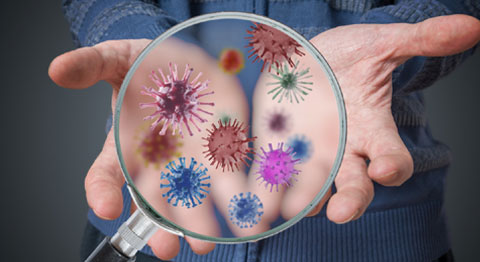
According to some studies 1500 germs can be traced on each square centimetre of skin on our hands. They thrive even in more numbers in the areas between the fingers and underneath the nails.
Which are the different types of hand cleansing agents?
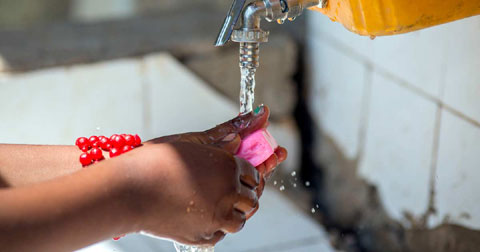
The hand cleansing agents can be divided in three different types. They are as follows:
1) Detergents – These are plain soaps used with water to remove dirt and germs.
2) Antiseptic surgical scrubs – These surgical scrubs include scrubs like betadine.
3) Antimicrobial agents – These antimicrobial agents include agents like chlorhexidine.
How many germs can be killed through hand washing?
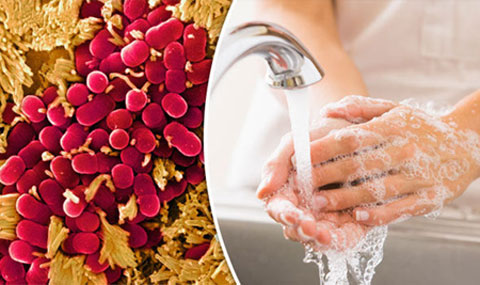
According to research, when hands are washed for at least 15 seconds with soap and water hands become 90% germ free. To get 99.9% germ free hands another round of 15 seconds should be added to the hand washing regimen. So, to get germ free hands it is necessary to wash hands with soap and water for at least 20 to 30 seconds on an average.
For how long do hands remain germ free after washing them?
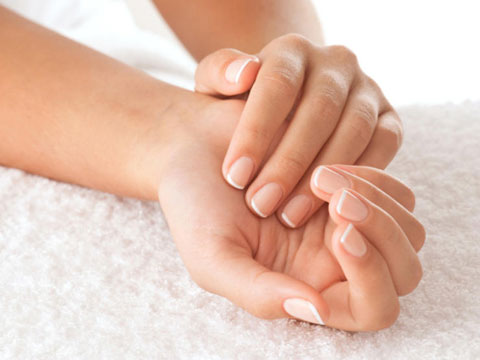
Hands can carry germs again if a person touches contaminated substances or surfaces immediately after washing hands. Therefore, it is always advisable to wash hands before and after eating or before touching face, eyes, nose or lips. At the same time to keep the hands clean after washing it is mandatory to stay away from the substances and surfaces that may carry germs.
What are the 7 steps of hand washing recommended by WHO?
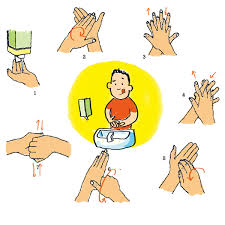
The ideal time that is recommended by WHO to wash hands thoroughly is at least 20 seconds. Take a quick look at these steps.
Step 1: Wet Your Hands
Wet your hands and apply an adequate amount of soap that can help you to create a good amount of lather.
Step 2: Rub Your Palms
Rub your palms together in clockwise and anticlockwise direction.
Step 3: Rub Back Side of Your Hands
Rub the back side of your hands with the help of your fingers.
Step 4: Rub Palms and Fingers
Rub your palms and fingers together by interlinking and clasping them together.
Step 5: Form Cup with Fingers
Rub both of your hands by forming a cup with fingers. By interlocking your fingers, rub the back side as well.
Step 6: Clean Your Thumbs
Clean your thumbs by rubbing them with the help of your fingers.
Step 7: Rub Your Palms
Use your fingers to rub the palms of both of your hands.
After you follow the above-mentioned steps, you must clean your hands thoroughly with clean water and then dry them using a clean towel.
Remember, germs are everywhere, and the more surfaces your hands come into contact with, the more germs you pick up. The importance of washing your hands often to disinfect them and to get rid of the buggers cannot be stressed enough.
How to wash hands the right way? Why is it necessary to wash hands for 20 seconds? What is the importance of using soap while washing hands? Discuss here.





